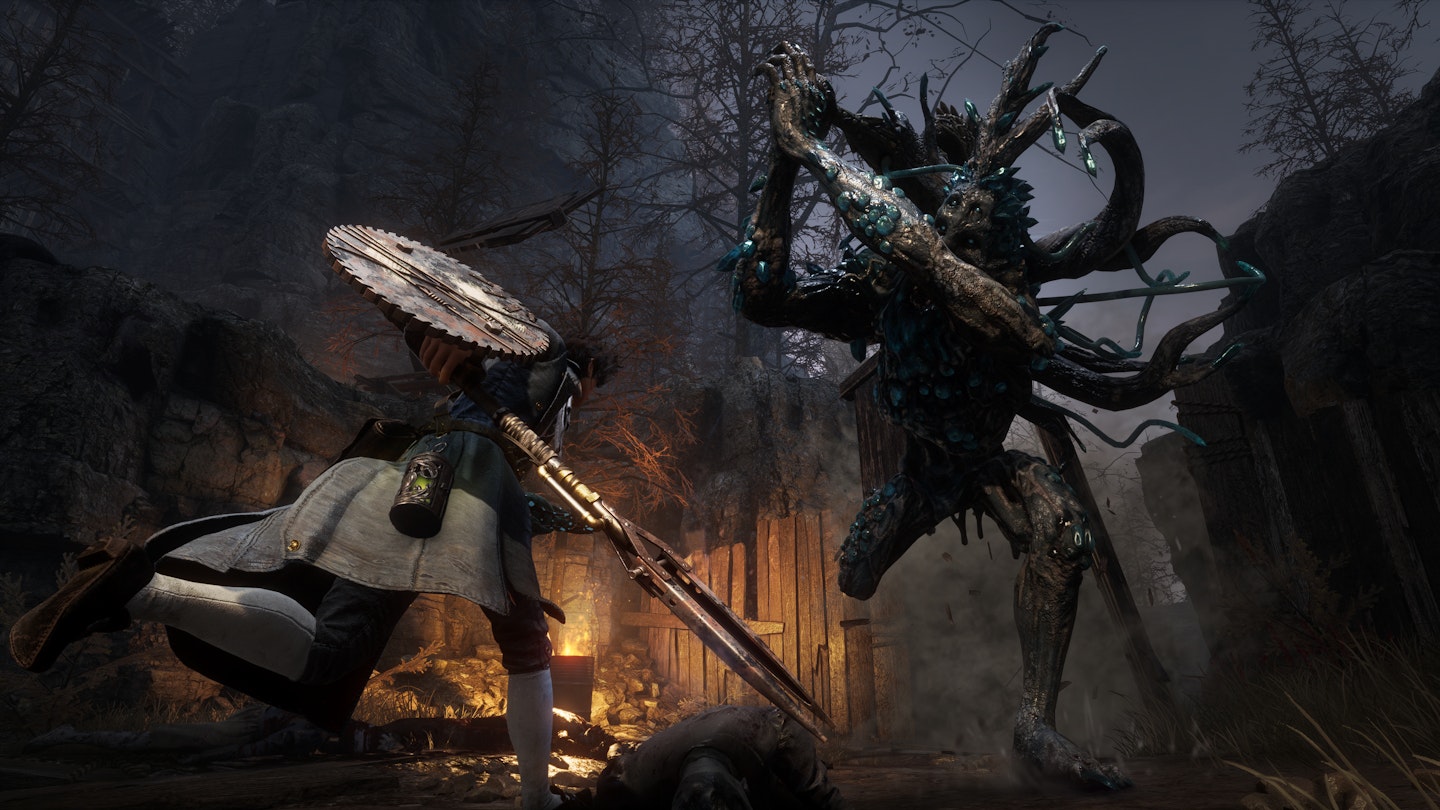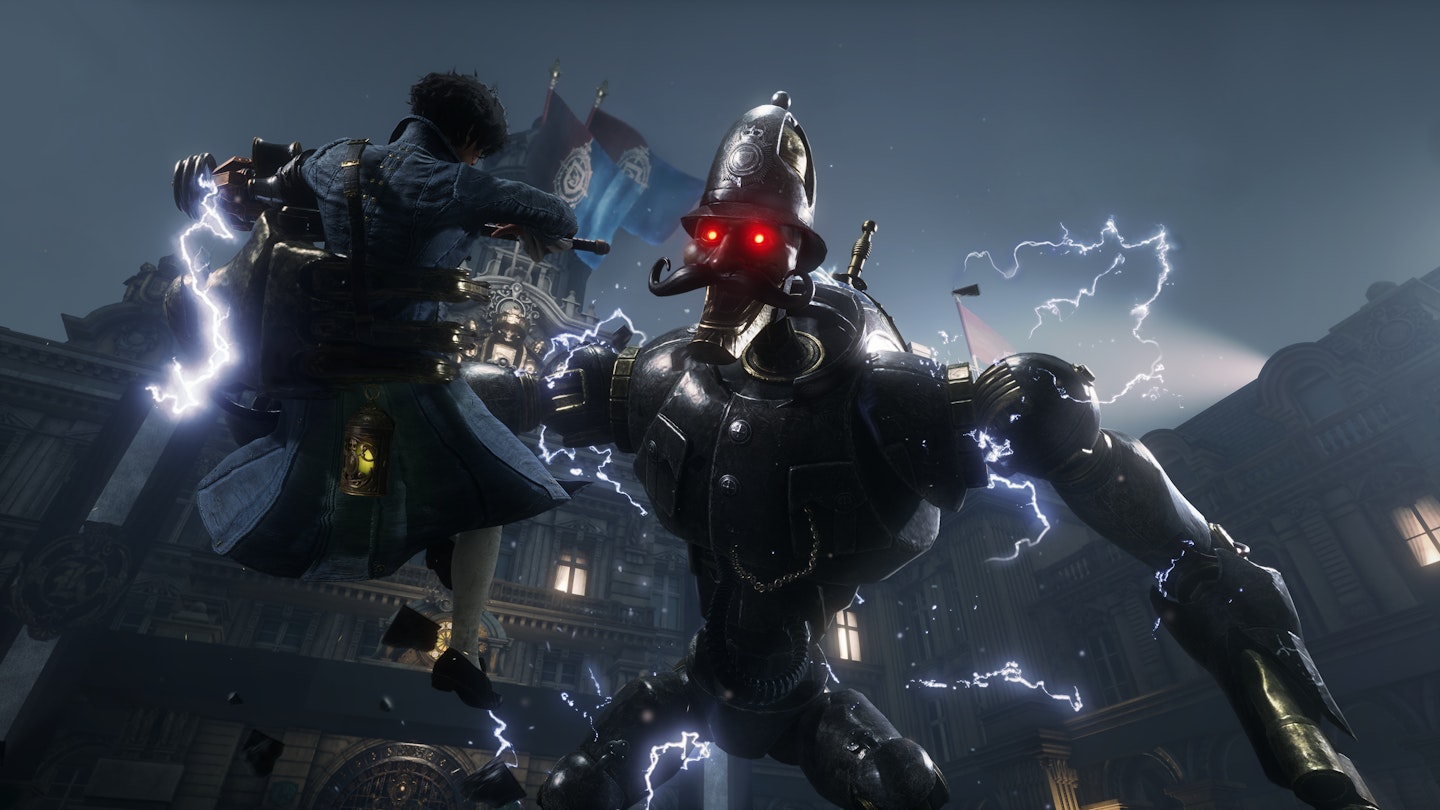Platforms: Xbox Series X|S, Xbox One, PS5, PS4, PC, Mac
There's always something creepy about puppets, isn't there? It's probably related to the uncanny valley effect, how real humans reject approximations of ourselves that aren't quite right, an innate aversion to unnatural homunculi. It's a reaction at the heart of Carlo Collodi's original The Adventures of Pinocchio, where villagers reject the wooden boy, and both the classic story and that sense of unease around puppets serve as the basis for Lies of P.
Coming from Korean developers Neowiz Games and Round8 Studio, Lies of P is a new entry in the soulsborne genre, albeit still in the 'classic' fashion of Dark Souls and Bloodborne, full of twisty, labyrinthine maps rather than the unrestrained open world of Elden Ring. It transplants the loose skeleton of the Pinocchio story to the darkly beautiful city of Krat, a gothic steampunk world where the advanced puppetry of Geppetto has led to an industrial revolution, with clockwork automatons serving all of humanity's needs, from labour to companionship. Until the robot uprising, of course. Now, as a strangely beauteous version of Pinocchio, you're the only one capable of navigating Krat's streets, defeating puppets gripped by a violent frenzy, and seeking out your creator in hopes of restoring order.

As a soulsborne, Lies of P doesn't do much to rock the boat, its lineage directly traceable back to the earliest examples of the genre. A rare form of energy called Ergo is gathered from defeated foes, spent to level up Pinocchio's skills, but lost if defeated before using it. Common enemies respawn whenever you use a Stargazer, this game's equivalent of bonfires in Souls, and shortcuts can be created by working your way around each fixed area to open a gate or lower a ladder. So far, so Dark Souls.
Where Lies of P begins to carve out more of an identity for itself is in its combat. It's familiar enough to dive right into for soulsborne fans — attacks mapped to shoulder buttons, a lock-on and dodge system, all the old favourites — but pretty quickly reveals its unique tweaks. A lot of this comes from its sword-based weapon customisation, where Pinocchio can disassemble and recombine the blades and hilts of different weapons into one with the best attributes of both. For instance, the powerful but slow blade of a greatsword can be joined with a rapier's handle, gaining a notable speed boost without losing much power. In truth, there's not a great variety of base weapons, but there's considerable flexibility in how you rebuild them. Weapons can also be elementally charged, adding an electric or fire effect to better target enemy weaknesses.
Delectably gothic and stylish, Lies of P is one of the best new entries in the genre in years.
The one aspect of this already mostly human-looking Pinocchio that highlights his artificial origins is his left arm, which serves as another weapon. Dubbed a Legion Arm, this is another customisable tool, swappable at Stargazers, each one having a particular skill. The Legion Arm is another nice way to switch things up depending on either your personal play style — for instance, players who prefer to keep their distance may enjoy the Puppet String arm, allowing you to yank a single enemy towards you — or tailor the loadout to better target specific enemies, such as with the Fulminis arm: basically a flamethrower with fingers.
Unlike many other soulsborne games though, there's a far more direct story to follow here, which may win over players who find themselves lost by the light dustings of lore scattered over FromSoftware's better-known titles. It's far from a beat-for-beat adaptation of Collodi's work, more a collection of allusions and grim twists on familiar moments, but it's enough to draw you through the game with purpose. Collodi's characters are also massaged into Lies of P in surprisingly elegant fashion, from the Blue Fairy serving as a mysterious figure named Sophia, the Talking Cricket as a guide called Gemini (pronounced "Jeminy", a nod to the Disney version), while the Fox and the Cat here are humans wearing animal masks, members of a group called Stalkers who hunt down the rogue puppets plaguing Krat. Combined, it all creates a wonderfully dark and alluring aesthetic.
Of course, what's a Pinocchio tale without the boy's penchant for telling fibs? Lies play a major role here — it's in the name, after all — with Pinocchio faced with the decision to tell the truth or lie at key points. This forms the basis of a loose morality system, and although, in the moment, it seems designed more to force the player to make uncomfortable choices (such as whether to tell a grieving mother that her baby is in fact a doll), the amount of lies told factors into the game's branching endings.
There are frustrations, though, and not the 'good' kind of frustrations inherent to the soulsborne genre that usually beckon you to try, try, try again. The combat simply isn't as polished as it could be, with odd hitboxes meaning your strikes might not connect, or worse, you'll be tagged by enemy attacks you think you've successfully dodged. Pinocchio's sometimes sluggish dodging can be improved by appropriately upgrading his P-Organ (no giggling — it's another way to modify his skills), but evasion never feels as smooth or reliable as it should. And, with swords being the de facto weapon, Pinocchio's range is relatively fixed, leaving precious few ways to counter enemies brandishing ranged attacks or much longer weapons.
Most annoying, though, is the difficulty curve — while the entire soulsborne genre thrives on challenge, Lies of P is ludicrously tough early on. It also commits a cardinal sin by arbitrarily blocking off levelling up without explanation in its prologue, before most abilities are available and ahead of a thunderously tough first boss. This doesn't so much entice players to force their way through to see what awaits, as it does potentially drive them to put the controller down and never pick it up again.
Still, for those who do power through, this unlikely take on Pinocchio ultimately proves a captivating fable. Delectably gothic and stylish, Lies of P is one of the best new entries in the genre in years, and that's the truth.
